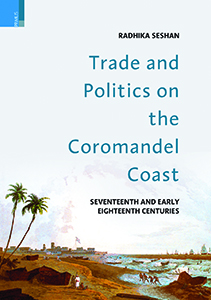
INFORMATION
- AUTHOR : Radhika Seshan
- HB ISBN : 978-93-80607-25-2
- PB ISBN : 978-93-84082-35-2
- HB Year : 2012, PB Year : 2015
- Extent : x + 138 pp.
- Discount available on checkout
- Usually dispatched within 3 to 5 working days.
Trade and Politics on the Coromandel Coast
| HB ₹ 695 . $ . ₤ |
PB ₹ . $ . ₤ |
|
| POD ₹ . $ . ₤ |
e-Book ₹ . $ . ₤ |
INFORMATION
- AUTHOR – Radhika Seshan
- ISBN – 978-93-80607-25-2
- Year – 2012
- Extent: 400 + 40 coloured illustrations
- 10% discount + free shipping
- Usually dispatched within 3 to 5 working days.
This work is a study of the connections between trade and politics in the Coromandel Coast in the seventeenth and eighteenth centuries, with special focus on Madras. It questions the largely uncontested view that trade and traders in pre-modern India were disconnected from the world of politics and the state, arguing instead that south Indian merchants depended on, and functioned within the structures and the stability provided by the state.
Trade and Politics on the Coromandel Coast: Seventeenth and Early Eighteenth Centuries addresses the breakdown of the political structures within which the merchants operated, and the impact of the arrival of the Europeans, especially the English. In so doing, it explores the transitional nature of the seventeenth century and the ways in which the European trading companies, Indian states, and merchants interacted with each other. Situated within the larger historical context of the trading world of the Coromandel Coast, this regional history challenges accepted notions about the place of merchants and the state, and through a detailed economic history, sheds new light on the political and transitional nature of the period.
The Author
Dr Radhika Seshan is an Associate Professor at the Department of History, University of Pune. She is currently on lien at the Centre for Regional Studies, University of Hyderabad. She has edited a number of books, of which the most recent is History of Modern Deccan, Vol. II: Socio-Economic and Cultural Aspects, which she has edited jointly with A.R. Kulkarni and M.A. Nayeem.
‘Dr Radhika Seshan raises a series of questions, especially on the contested relationship between politics and trade, showing some very intricate and important connections. Though much of the information here is familiar, this is still a lively and well researched account.’— MICHAEL N PEARSON, University of New South Wales
This work is a study of the connections between trade and politics in the Coromandel Coast in the seventeenth and eighteenth centuries, with special focus on Madras. It questions the largely uncontested view that trade and traders in pre-modern India were disconnected from the world of politics and the state, arguing instead that south Indian merchants depended on, and functioned within the structures and the stability provided by the state.
Trade and Politics on the Coromandel Coast: Seventeenth and Early Eighteenth Centuries addresses the breakdown of the political structures within which the merchants operated, and the impact of the arrival of the Europeans, especially the English. In so doing, it explores the transitional nature of the seventeenth century and the ways in which the European trading companies, Indian states, and merchants interacted with each other. Situated within the larger historical context of the trading world of the Coromandel Coast, this regional history challenges accepted notions about the place of merchants and the state, and through a detailed economic history, sheds new light on the political and transitional nature of the period.
The Author
Dr Radhika Seshan is an Associate Professor at the Department of History, University of Pune. She is currently on lien at the Centre for Regional Studies, University of Hyderabad. She has edited a number of books, of which the most recent is History of Modern Deccan, Vol. II: Socio-Economic and Cultural Aspects, which she has edited jointly with A.R. Kulkarni and M.A. Nayeem.
‘Dr Radhika Seshan raises a series of questions, especially on the contested relationship between politics and trade, showing some very intricate and important connections. Though much of the information here is familiar, this is still a lively and well researched account.’— MICHAEL N PEARSON, University of New South Wales
Table of Contents
| Acknowledgements | ix |
| Introduction: ‘The Time has Come’ | 1-12 |
| 1. ‘To Talk of Many Things’: The Trading World of pre-Seventeenth Century Coromandel | 13-28 |
| 2. ‘Of Cabbages and Kings’: Merchants, Trade and Politics | 29-56 |
| 3. ‘Shoes, Ships and Sealing Wax’: Chief Merchants and Others | 57-83 |
| 4. ‘Our Fort and City’ | 84-101 |
| Conclusion: ‘Running in the Same Place’ | 102-113 |
| Appendices | 115-121 |
| Bibliography | 121-131 |
| Index | 131-137 |




